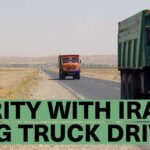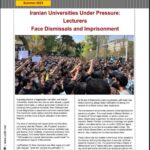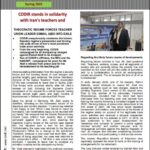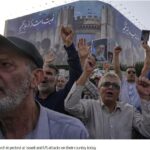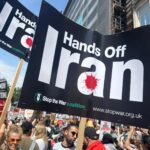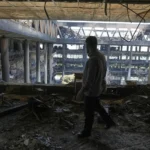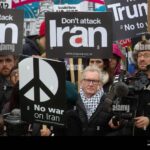Archive – CODIR CANADA
People’s Voice Forum
Thanks for inviting me to participate on behalf of CODIR.

CODIR Canada” was established in April 2007 as the Canadian chapter of “Committee for Defense of the Iranian People Rights” (CODIR), which was established more than 25 years ago, in UK.
CODIR Canada is a democratic organization devoted to campaign for peace, human rights and democracy in Iran.
CODIR Canada advocates peace and struggles to eliminate the risk of war and tensions in and around Iran, generally in the Middle East region.
CODIR Canada campaigns to abolish the brutal violation of Human Rights and all limitations to true democracy in Iran. It also promotes democracy, freedom of speech, freedom of media, freedom to organize, protecting the rights of minorities, and the right of people to elect and be elected at all levels of government.
CODIR Canada campaigns to raise the Canadian public awareness of peace, human rights and democracy issues in Iran. It strives to provide truthful and unbiased information and analysis about the reality of life in Iran. We promote cooperation with other organizations that agree with our goals, and seek the solidarity of individuals and organizations such as trade unions, government representatives, and human rights coalitions and activists.
CODIR Canada’s activities are directed and steered by its founding members however we work closely with our sister org in the U.K.
Our role in building support for democracy in Iran includes the need for sections of civil society to express its opinion. Let’s look at some of those voices in Canada to date:
Trade unions:
Trade unionists have led rallies around the world to express solidarity with “the many Iranian workers” who have joined demonstrations against the fraudulent election results in Iran.
Protesters held demonstrations at Iranian embassies in Ankara, Bangkok, Brussels, Canberra, Geneva, Jakarta, London, Madrid, New Delhi, Oslo, The Hague, Tokyo, Toronto and Wellington.
Global unions The International Trade Union Confederation (ITUC), Education International (EI), The International Transport Workers’ Federation (ITF) and the International Union of Food, Agricultural, Hotel, Restaurant, Catering, Tobacco and Allied Workers’ Associations (IUF) supported the June worldwide day of action to protest against the “lack of respect for human rights” within Iran.
In a letter sent to the Supreme Leader of Iran, the unions, which together represent over 170 million workers, called for full democratic rights for all Iranians. They specifically demanded that the clerical regime respect freedom of association and freedom of assembly.
And the unions called for a halt to all violent repression, the release of all imprisoned trade unionists, recognition of all independent workers’ organisations in Iran, respect for core labour standards and the ratification of all fundamental ILO Conventions, in particular those relating to freedom of association and collective bargaining, a halt to all anti-union repression and the reinstatement of unfairly dismissed workers.
ITUC general secretary Guy Ryder said: “We have exhausted all avenues of reasonable dialogue to persuade the Iranian government to allow basic human and trade union rights. “Their answer has been repression and arrests. Given this failure we must protest publicly against what is happening in Iran.”
Here in Canada, the CLC issued their statement:
“The Canadian Labour Congress (CLC) joins groups from around the world to communicate our deep concern over the turn of events related to the recent Iranian elections and its aftermath. We urge your government to act swiftly in establishing a transparent and legitimate election process in your country, one where only truly elected candidates are chosen to represent the people.
Last week in Geneva the International Labour Organisation (ILO) placed Iran on a short list of countries that consistently violate internationally recognized standards for the protection of women, children, religious minorities, as well as workers and trade unions. The Canadian Labour Congress was among those who provided testimony to the special ILO review of Iran and we join the international community in asking you to stop the repression of your citizens, especially of those who speak up to defend human dignity and justice.
Today there are over ten trade unionists detained in your prisons and they are a living testimony to your government’s disdain for the right of workers to organize and be represented by trade unions in Iran. These trade unionists join a long list of others who in the past have resisted the exploitation, persecution and imprisonment of citizens from different sectors of Iranian society. The recent May Day rally in Tehran where over 150 people were either violently attacked or arrested by your security forces, is illustrative of the repression that has reigned in your country for over a decade, now.
The introduction of democracy and the establishment of internationally-recognized human rights in your country are a prerequisite to solving the current political and economic crises in Iran. We strongly urge you to comply to the numerous calls by the ILO to provide information on how Iran will conform to already ratified employment and equality-related Conventions. Further, we strongly urge you to commence a process with the ILO to ratify Convention 87 on the Freedom of Association and Convention 98 on Collective Bargaining.
Meanwhile, the immediate and unconditional release of all trade union prisoners including the remaining detainees of this May Day’s arrests is imperative. We need to hear from the leadership of your country that Iran intends to join the international community in respecting the freedom of thought and expression. In your failing to do so, the CLC wholly endorses the organization of rallies and public demonstrations – in Toronto and elsewhere in Canada – in support of such an outcome. ”
Yours sincerely,
Kenneth V. Georgetti
President Candian Labour Congress
CTF/CUPE/NUPGE/CAW authoured a letter of protest as well.
Amnesty international has continued to monitor the post election protests and Posted a demand on 15 July 2009 Nearly 200 detainees from ‘9 July’ protest alone Call on the Iranian authorities to ensure that detained protesters are not tortured or mistreated. “Amnesty International today expressed fresh concern for the fate of hundreds of people detained in Iran following the post-election crackdown, with many detainees being held in undisclosed locations across the country.
Those detained include up to 197 people reported to have been arrested last week (9 July) at a demonstration marking the 10th anniversary of the violent suppression of student demonstrations in 1999.
In total Amnesty International has compiled a list of the names or identities of 368 people arrested since 12 June. Some of those detained have since been released but may face prosecution in the future. ”
Here are some of the Challenges we face in building the struggle Iran: • Most Canadians are observers when it comes to human rights. They often sit on the sidelines while the most active on positions engage in debate;
• Many Canadian born citizens see this as a struggle to be waged by those from Iran:
• Misconceptions that demanding democracy in Iran and supporting the protests against a fraudulent election are somehow falling into Imperialism’s hand; work of the CIA or support one Islamist over another?
• We see that these demonstrations are cross class protests by millions of Iranian citizens who deserve our support;
• We as activists see the current struggle as part of a long standing process of resistance and stand in solidarity with our sisters and brothers fighting for a free, progressive and democratic Iran.
For our part, we will continue to work in solidarity as allies with those resisting violence and tyranny in Iran.
top
A small thank you note from CoDIR Canada for event in memory of the victims of mass executions of political prisoner in Iran of the summer of 1988.
CODIR Canada

Dear friends
Tonight we met to remember our fallen heroes, the victims of a National Tragedy in the summer of 1988
Those heroes who are no longer with us but will always live in our hearts and minds. They will give us the strength to seek justice in their names. They will give us courage to put aside all trivialities and focus on the struggle for human rights for the people in Iran and peace in the region; the struggle against any outside intervention and intervention in the affairs of the people of Iran.
My first note of deep gratitude goes to the members of the Organizing Committee. We thank you for giving us at CODIR Canada the honour to work with you. I will say this with all my heart that it would not have been successful without the efforts of each and every one of you in making this a memorable event.
Second, to our good friends who honoured us with their presence and helped us in obtaining the hall [the CPC club of University of Toronto], the loan of the projector [Miguel Figereoa, the Leader of the Communist Party of Canada], musicians who soothed our hearts of the ongoing grief of our loss [Maneli Jamal and the Santour duet group] and finally, the most important, our speakers who talked about the immense need for the struggle for human rights and peace, and of the condemnation of torture [the Honourable Mr. Charles Roach, Dr. Ezzat Mosallahnejad from the Canadian Centre for the Victims of Torture, Domenic Bellissimo from the Ontario Secondary School Teachers Federation, and Dimitris Kabitsis from the Greek Canadian Democratic Organization]
I would like to take this opportunity to thank Stefanie, our sister in the community of the First Nations for trying very hard to extend our solidarity to the struggle of the 6 Nations and invite them to our event. Their presence at the barricades is essential and so could not come to our event. Their struggle and our struggle, like all struggles for justice are linked
Despite the shortness in time, our friends in the community of Radio CKLN did announce our event through their Word of Mouth program. To them, we also extend our sincere gratitude, specially to Marshalla McTyson.
Here we can not forget our esteemed community weekly, Shahrvand, for having sent a reporter to record and publicize the event. We do indeed thank you for your kind presence and your efforts in educating your readership.
And finally my thanks go to those attended the event, who , at the end, pitched in to help re-arrange the hall back to it original state.
Many thanks go to all of you
CODIR – Canada
The Committee for the Defense of the Iranian People’s Rights – Canada
www.codir.net
codir.canada@gmail.com
top
CODIR-Canada reaches out for Solidarity
CODIR Canada

To: Political Parties, Labor Unions, Women, Student, GLBT, First Nations, Peace Organizations and all Organizations, and Individuals concerned with issues of Human Rights
The life of people in today’s Iran is probably comparable to what can be imagined as the harshest. The rate of employment is one of the lowest in the contemporary history: widespread poverty, corruption at all levels of government, the social problems such as drug trafficking and substance abuse, prostitution, wide range of child abuse, and oppression against women, gays and lesbians are at record high and still rising. Social security is at its lowest level and phenomena such as robbery and murder has become extremely common. Nepotism and favoritism and abuse of the “power of money”, for those who have it, have left people in utter desperation. The clamp down on media and the dissident groups and individuals, violation of freedom of speech and freedom to organize, ethnic and religious discrimination and also the discrimination based on gender have turned the living conditions even more intolerable. The list goes on and on.
For those familiar with the recent history of Iran existing conditions should not be surprising. This is the natural consequence of twenty eight years of complete neglect and the most destructive policies of the regime of the “Supreme Religious Leader” (Velayat-e faqih). These policies remain intact only by the imposition of brute force by one of the mob factions within the ruling circle and have singular purpose to retain their hold on power and fill their own pockets with billions of dollars appropriated from the people of Iran.
The “election” of Mahmoud Ahmadi-Nejad in the rigged and fraudulent presidential election of 2005 was a significant turning point in the life of Iranian regime. Faced with a vast and popular reformist movement, which had come out against all these hardships to outright challenge the regime’s power, the regime decided to use its heavy hand to strike a blow with the intention of wiping out the reform movement.
Since his “election”, Ahmadi-Nejad has missed no opportunity to accomplish this task and has shown extreme persistency in striking against the women, youth and students, intellectuals and the workers. Not a day passes by without activists in various social groups being beaten up, getting disappeared, arrested and convicted for crimes they never committed.
Unfortunately the international situation is not in favor of the Iranian people either. The threat of war, while Afghanistan and Iraq are already occupied by foreign occupiers, led by the United States, only exacerbates the situation. The people of Iran have no doubt that if a war starts against them, as seen in the case of Iraq and Afghanistan, their lives will worsen further.
Beside the threat of war, the U.N. sanctions are making the already bad living conditions even worse. The most immediate effect of the sanctions could be seen in the inflation and the rise of prices. In the past few months, people are facing a hyper inflation unprecedented even in the life of the Islamic Republic. The rising prices have put the basic living necessities out of reach for even more people and have created a state of despair and helplessness.
Dear friends,
It is under these circumstances and in the spirit of solidarity that we in the Committee for the Defense of Iranian People’s Rights (CODIR) – Canada, are writing this letter to introduce ourselves and to let our aims be known:
“CODIR-Canada campaigns to raise the Canadian public awareness of peace, human rights and democracy issues in Iran. It strives to provide truthful and unbiased information and analysis about the reality of life in Iran.”
And also:
“CODIR-Canada advocates for peace and struggles to eliminate the risk of war and tensions in and around Iran, and generally in the Middle East region.”
And:
“CODIR-Canada campaigns to abolish the brutal violation of human rights and all limitations to true democracy in Iran. Among many other rights, it promotes democracy, freedom of speech, freedom of media, freedom to organize, protecting the rights of minorities, and the right of people to elect and be elected at all levels of government.”
In today’s globalized world, the effect on nations’ lives is also globalized more than ever before in the human history. The collective power of individuals and groups in the humanist traditions can have a significant impact on the lives of other nations. We reach out for your solidarity with the people of Iran. Sincerely Yours Committee for the Defense of Iranian People’s Rights (CODIR) – Canada
www.codir.net
codir.canada@gmail.com
top
Women’s struggle in Iran
CODIR Canada

The Iranian Parliament, majority of which is composed of reactionary forces, recently ratified a law dealing mainly with the rights and value of women in the Islamic republic. One provision includes, as of spring of 2007, a special dress code, designed by the regime, was to be in effect for all female government employees.
There are 500 stores, which sell the approved clothing, exempting them from paying any taxes. In addition, the government has allocated a huge budget toward the import of fabric; hence gaining the full support of Sepah-e- Pasdaran and Baseej (two of the regime’s main paramilitary forces), whose management will largely profit.
Upon this announcement, a new wave of crackdown has been launched on women nation wide. Pictures of women with blood splattered faces have been strewn across the media; a brutal display of Baseej and other paramilitary force.
Right now the policy of importing the fabrics has all but eliminated the local textile manufacturing businesses but made big profits for some corrupt government institutions and investors; an added cost to women being hit and humiliated.
As if these debasements were not enough, Iranian women faced a second onslaught this week. The interior minister recommended that in order to solve the complex “relationships” between men and women in society, temporary marriage (sigheh) should be an option.
This medieval practice of religious enforced prostitution has provoked vast criticism and opposition among lawyers, human rights activists and university professors.
This law, clearly misogynistic and outdated, is the regime’s answer to the very act of its ratification and indicates the regime’s addmission the notion that they announce there is serious problem in Iran after 28 years of establishing Islamic Republic of Iran and enforcing sharia law, thus shows how demonic they are when they indicate that ” Iran is the most free and the most Islamic country of the world.”!!
June 12th is a day of solidarity with Iranian women. Two years ago, since election time was approaching, hardliners eased and women were given relative freedom. Peaceful demonstrations were held aimed at obtaining complete equal rights under the constitution.
For the first time these acts of civil disobedience united more than 50 non-governmental organizations behind one cause: equal rights for women, struggling openly and powerfully not behind closed doors but in plain view.
The oppressive regime tried to censure them and maintained that the ideal place for a woman is in the home; this in a country where 65% of university students are women! Their demands were accused of being “westernized” and not in tune with the Islamic faith.
Active women are struggling even in the prisons. Their big “sin” is disseminating sexism discrimination and that’s the reason they call them “soft regime changers”.
The campaign against stoning as a corporal punishment could disclose the brutality of this medieval law. Many progressive personalities have supported this campaign and consequently some officials announced that “there is no stoning laws” in Iran.
Women’s movement has an important role in the people’s struggle for equality, freedom and social justice and could attract vast majority of the women to the struggle for peace and justice.
www.codir.net
codir.canada@gmail.com
top
Statement of Principles
CODIR Canada

1. “CODIR Canada” was established in April 2007 as the Canadian chapter of “Committee for Defense of the Iranian People Rights” (CODIR), which was established in 1981, in UK.
2. CODIR Canada is a democratic organization devoted to campaign for peace, human rights and democracy in Iran.
3. CODIR Canada advocates peace and struggles to eliminate the risk of war and tensions in and around Iran, generally in the Middle East region.
4. CODIR Canada campaigns to abolish the brutal violation of Human Rights and all limitations to true democracy in Iran. It also promotes democracy, freedom of speech, freedom of media, freedom to organize, protecting the rights of minorities, and the right of people to elect and be elected at all levels of government.
5. CODIR Canada campaigns to raise the Canadian public awareness of peace, human rights and democracy issues in Iran. It strives to provide truthful and unbiased information and analysis about the reality of life in Iran.
6. CODIR Canada promotes cooperation with other organizations that are partially or completely devoted to its goals, and seeks the solidarity of peace-loving, progressive, and democratic individuals and organizations such as trade unions, government representatives, and human rights coalitions and activists.
7. CODIR Canada’s activities are directed and steered by its founding members.
8. CODIR Canada is based in the city of Toronto, province of Ontario and is bound by Canadian laws.
www.codir.net
codir.canada@gmail.com
top
An Appeal for Peace
CODIR Canada

Right Honorable Member
House of Commons,
Parliament of Canada
Ottawa, Ontario
Honourable Member of Parliament,
Recent news coming from the Middle East especially in regards to Iran and the military threat by the US against this country raises deep concern. The presence of U.S. carriers in the Persian Gulf, their military maneuvers in the accompaniment of other countries in the region and the reports of U.S. fighter jets flying over Iranian airspace are only a few among many. There is no doubt that escalation of conflict in the Middle East can endanger peace and stability and cause much suffering to the people in Iran and the whole region.
Recent military actions including the occupation of countries such as Afghanistan and Iraq have proven to bring nothing but vast destruction, loss of people’s lives and the collapse of the infrastructure of the countries. Any military action against Iran can not be exceptional and with no doubt will bring similar results, only to a larger scale.
Honorable Member of Parliament,
We have no doubt that repressive and anti-democratic regimes such as the regime of “Supreme Religious Leader” in Iran are among those who not only don’t do any good to their people, they even don’t wish well for them. We are all well aware of their track record on human rights and the atrocities they have committed against the Iranians. However, as seen in recent history, notably in Iraq and Afghanistan, external meddling into the affairs of independent countries, including military action has brought nothing but misery and disaster upon their people.
Honorable Member of Parliament,
The people of the Middle East, especially the Iranian people, have had their share of war and destruction. The people of this region simply can not stand another military action which does nothing but accentuate their miseries.
It is with this fact in mind that we are writing to urge you, as our representatives in the parliament, to raise your voice to prevent another disastrous war in that region.
Make Peace! Say No To War!
Sincerely Yours Committee for the Defense of the Iranian People’s Rights (CODIR) – Canada
www.codir.net
codir.canada@gmail.com
top
U.S. THREAT TO IRAN ESCALATES
by Canadian Peace News and with permission from Saskatchewan Peace News

Recent events indicate that George Bush, instead of learning from the debacle of his invasion of Iraq, is planning not only to resort to a surge of troops in that country, but to spread the conflict to include Iran. The most recent is the increase in sanctions against Iran decreed by the U.N. Security Council, and protests about the seizure by Iranian forces of British troops who they charged had illegally entered Iranian waters in the Persian Gulf. The fact that shortly before that American forces had seized five Iranian diplomats who were legally in Iraq on official business, and in spite of objections by the Iraq government, is ignored.
Already last May the Los Angeles Times reported that the administration had set up new Pentagon and State Department offices on Iran, signifying a ‘more confrontational stance’ toward that country.
In January Reuters news agency noted a U.S. military buildup along the Black Sea, coupled with the recent move of two U.S. aircraft carrier battle groups into the Persian Gulf close to Iran. The U.S. now has more firepower stationed in the Persian Gulf than at any time since the beginning of the Iraq war.
In February a Seymour Hersch article appeared in the New Yorker magazine, spelling out U.S. plans to create more turmoil in Lebanon, Syria and Iran by fomenting Sunni-Shiite hostility.
Also in February Phyllis Bennis, a Fellow of the long-standing Institute for Policy Studies in the U.S., and the Amsterdam Transnational Institute, issued a paper warning that the Bush administration is significantly ratcheting up its threats against Iran, threatening a ‘preventive’ attack in violation of the U.N. Charter, the Non-Proliferation Treaty, and even the U.S. Consti-tution. Bennis states that, in addition to ‘overheated U.S. rhetorical accusations’ about Iran’s nuclear ambi-tions, and charges that Iran is directly responsible for killing American troops in Iraq by providing bombing equipment to Iraqi insurgents, U.S. provocations include sending a second aircraft group to the Persian Gulf and minesweepers to the Strait of Hormuz; arrest-ing Iranian officials legally working in Iraq; backing anti-Iranian Mujahideen guerrillas; and continuing pressure in the U.N. to expand sanctions against Iran.
The U.S TV network CNN has reported that Bush has asked Strategic Command – which includes the U.S. nuclear arsenal – to prepare plans for a possible U.S. attack on Iran. Even the New York Times has editorialized that the Bush administration is ‘bullying’ Iran, noting that the one tactic the administration is refusing to consider is diplomacy. In particular, Bush is ignoring the report of the bi-partisan Iraq Study Group, which recommended that the U.S. begin ‘extensive and substantive’ talks with Iran and Syria, with no preconditions, to solve the Iraq crisis. Instead President Bush has taken a precisely opposite line, blaming Iran and Syria for U.S. losses in Iraq.
As Bennis recounts in her paper, U.S. antagonism towards Iran is an old story. The U.S. overthrew the democratically elected Iranian leader Mohammed Mossadegh in 1953; they installed, armed and protected the brutal dictatorship of the Shah of Iran which lasted until 1979; they cut off diplo-matic relations and imposed a variety of crippling sanctions on the Islamic Republic which threw out the Shah; and they provided seed stock for biological weapons, targeting information for chemical weapons, and financial backing for Iran’s enemy, Iraq, throughout the yeas of the Iran-Iraq war (1980-1988).
In 2003, Iran proposed a comprehensive ‘grand bargain.’ It reportedly offered more stringent inspections by the Inter-national Atomic Energy Agency of Iran’s nuclear activities; acceptance of the 2002 Arab League proposal that would allow normalization of relations with Israel in exchange for an Israeli withdrawal from all the 1967 occupied territory; ending material support to Hamas from Iran; and providing the U.S. with names of al-Quaeda operatives in Iranian custody. But the U.S. government did not take the offer seriously.
Iran and Iraq have traditionally competed for territory, oil rights, military control and influence in the Middle East. This was not because Iran was Shi’a and Iraq’s government was run by Sunnis and was allied with largely Sunni Arab regimes, it was for territory, money and power in the region. More recently the U.S. has moved to prevent either Iran or Iraq from challenging overall U.S. domination of the same region with its oil and water resources. In the Iran-Iraq war the U.S. weighed in on the side of the weaker Iraq in order to keep both fighting and wasting the strength of both. Four years ago, after 12 years of sanctions, the U.S. invaded Iraq, and now even though that invasion has become a disaster for the U.S. administration, they are planning to attack Iran.
On the nuclear question, Bennis says Iran does not have nuclear weapons, and has not threatened the United States. As a signatory to the Nuclear Non-Proliferation Treaty it has the right to build and use nuclear power plants and to enrich uranium for peaceful purposes. The U.N.’s nuclear watch dog, the International Atomic Energy Agency (IAEA) has expressed concern over some lack of trans-parency in Iran’s program, but it has found no evidence of a nuclear weapons program. However, the Bush admini-stration remains committed to pressuring the U.S. to expand the sanctions imposed on Iran despite the IAEA having found no evidence of illegal nuclear weapons in Iran. At the same time Bush threatens to use nuclear ‘bunker-buster’ bombs to attack Iran. As Bennis emphasizes, according to the International Court of Justice, for the U.S. even to threaten to use nuclear weapons against Iran is a violation if international law.
Now, in an attempt to work up a ‘self defence’ justification for an attack on Iran the Bush administration has charged that Iran is responsible for the deaths of U.S. soldiers inside Iraq. In February U.S. military officials staged a news briefing in Baghdad, charging that Iran is providing new weaponry targeting U.S. troops in Iraq. The officials insisted on anonymity, barred cameras from the briefing room and provided no transcript of their statements. An official stated “We assess that these activities are coming from senior levels of the Iranian government.”
However the press conference did not provide any direct evidence, and two days later the Chairman of the Joint Chiefs of Staff, General Peter Pace, said he saw no evidence that the Iranian government was actually involved in arming militias in Iraq.
British journalist Patrick Cockburn, writing in the UK Independent, called the allegations bizarre. He noted that the U.S. had been fighting a Sunni-based armed insurgency in Iraq that is ‘deeply hostile to Iran.’ So why would Iran attack U.S. soldiers? According to Cockburn, about 1,190 U.S. soldiers had been killed by improvised explosive devices (IED’s) in Iraq since the overthrow of Saddam Hussein. Now the Bush administration has come up with a new term for this weapon – explosive formed penetrators (EFP’s). Cockburn comments that this may have been a tactic ‘to imply that a menacing new weapon has been developed.’ A February 10 New York Times article uncritically reported the U.S. claims about the ‘new’ explosive device, but buried in the article is the acknow-ledgement that its ‘first suspected use’ in Iraq ‘occurred in late 2003’ and that it has been used ever since. It is not a new weapon. Cockburn concludes: “The evidence against
Iran is even more insubstantial than the faked or mistaken evidence for Iraqi WMD’s disseminated by the U.S. and Britain in 2002 and 2003.” Asking “why now” about these U.S. accusations, BBC World Affairs correspondent Paul Reynolds says, “the fear among some is that the U.S. is softening up world opinion for an attack on Iran” – laying the groundwork for a ‘self-defense’ justification.
As Bennis points out, aside from the problem of lack of proof, there is a huge problem of hypocrisy in the U.S. making threats against Iran for ostensibly supporting militias, given that the U.S. backed Iraqi government is itself inextricably bound up with support for various Iraqi militias. And there is the overarching hypocrisy of the U..S. – which illegally invaded, bombed, and continues to occupy the entire country of Iraq from 8,000 miles away – threatening war against Iran on the grounds that Iraq’s next-door neighbor is the one ‘meddling’ in Iraq’s affairs.
The U.S. administration does not seem to have learned from its undertaking to invade Iraq, but it must be stopped. While there is a growing movement in the U.S. for the U.S. to get out of Iraq, members of Congress, including Demo-cratic opponents of the Iraq war are asserting that regarding Iran ‘all options must remain on the table,’ and House Democratic leadership has agreed to drop a provision that would have barred a U.S. attack on Iran without Con-gressional authorization. It is clear there is a big job facing the peace forces of the U.S. – to call for diplomatic solutions rather than military attack, and in the long term to bring about a Nuclear Weapons-Free Zone, or WMD-free zone throughout the Middle East, including an end to Israel’s nuclear arsenal and a prohibition against U.S. nuclear-armed submarines in the area.
The same big job faces peace forces in Canada to assist their counterparts in the U.S. Our Prime Minister is busy turning Canada into a 51st state and has been right behind Bush in every war move he makes. The peace forces here can make a huge difference in winning the struggle to stop escalation of the fighting in the Middle East, to stop the U.S. in its drive to control that area, and to turn the Middle East into a zone of peace.

